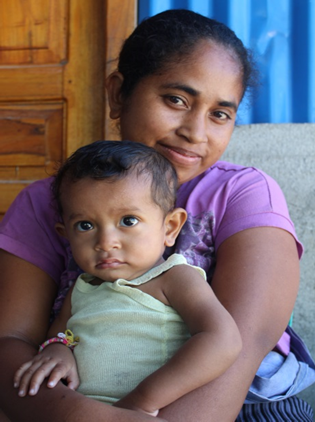Speeches Shim

It was midnight and Camelia de Jesus looked down to see her 9-month-old son struggling to breathe. “I was so nervous and desperate to see my baby, Pedro, in a frail condition,” she said.
The nearest health post was 4 kilometers away, the hospital 16 kilometers more and Camelia and her husband have only a motorbike. Fortunately, Pedro is happy and healthy today because the couple had access to community emergency transportation to the hospital.
Pedro’s trip was made possible through “Transporte Kommunidade,” a community solution to a pressing need in rural Timor-Leste introduced by USAID’s Reinforce Basic Health Project through the Timor-Leste Ministry of Health (MOH). TraKom, as it’s known in Timor-Leste’s far southwest municipality of Covalima, is a self-financed community solution to addressing home births with no medical attendant and other medical emergencies.
Reinforce works with village councils to develop community solutions to emergency needs. TraKom started last year in four villages under guidelines developed by a local NGO, which consulted with health professionals and community leaders at every step. That gave local ownership to the solution, a self-reliant move to resolve a major need.
More than half of rural women 15-49 report the distance to health facilities and the need to take a vehicle there are a major barrier to accessing health care, according to the 2016 Timor-Leste Demographic Health Survey.
“There is no transport available in rural areas, particularly up in the hills,” said Mateus do N. Mesquita, village chief in Beco, one of the four TraKom communities and the only one that has reported patient use. “We often just carry the sick person ourselves through the ways until reaching the point of transport access.”
The leader of the Holbolu neighborhood in Beco, Joaquim Amaral, said communities understand the importance of TraKom, which, he said helps the community get proper medical attention and helps him fulfill his responsibility as a community leader.
Villages pay for TraKom one of two ways, either a community managed fund or by having individual users pay a negotiated fee, which is what Beco did. This community solution requires no funding from USAID’s health project.
More than money motivates those who own vehicles and drive at all hours. “As part of being a human being, it is our duty to help each other,” said vehicle owner and driver Carlos Mau Martins. “I am willing to support my community by providing my transport (because) we call the ambulance but it often is not able to come to pick up the patient.”
Now that TraKom has been launched, USAID’s Reinforce will work with the MOH’s Health Promotion Department on a communication plan to share the Beco success with other communities and to advocate for them to add a TraKom service of their own.
Reinforce is a five-year, $8.5 million project focused on turning Covalima Municipality into a model for health care services in Timor-Leste. The project has focused on maternal and child health care and reproductive planning issues.

Comment
Make a general inquiry or suggest an improvement.